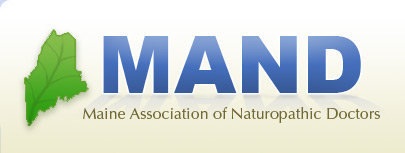I had my first personal encounter with a naturopathic doctor back in the 80s. One of my daughters had cracked and peeling feet. The doctor helped us determine the cause and recommended calendula cream. It worked.
I wrote about our experience and what I have learned since about naturopathic medicine in a 2013 blog post. When I wrote the post, Dr. Sarah Kotzur, who practices in Portland, was president of the Maine Association of Naturopathic Doctors (MAND).
The current president is Dr. Corrie Marinaro, who practices at New England Naturopathic Health in Waterville. I’m always interested in why people choose the paths they do, so asked Dr. Marinaro why she became a naturopathic doctor. She told me that in her early 20s she had to undergo a series of surgeries because of a history of ovarian cysts and endometriosis.
After college, she moved to California, where she was introduced to the concept of natural medicine. “I started to seek out other answers to the underlying causes of my health issues,” she explained. “It started me on the track of realizing that medical intervention, in terms of surgery and pharmaceutical medications, is not always necessary if you understand what the actual root causes are of your symptoms.”
Trying to find and treat the underlying causes of an illness rather than simply managing its symptoms is at the core of naturopathic medicine. Naturopathic doctors often use conventional imaging technology and laboratory testing to make a diagnosis. And they can prescribe some conventional medications, such as antibiotics and hormones. However, they prefer not to resort to medications or surgery and are more comfortable relying on nutrition, supplements, herbal medicine, homeopathy, acupuncture and health counseling. Their services are covered by some insurance companies.

Naturopathic doctors have been licensed in Maine for the past 20 years. To get that license, they have to be a graduate of one of six doctoral-level naturopathic medical schools accredited by the U.S. Department of Education. Four are in the United States.
Free health screenings
There are at least 30, maybe more, naturopathic doctors now practicing in Maine. Their numbers continue to grow across New England and the rest of the country. Yet, many people have little to no understanding of naturopathic medicine. That’s why Dr. Marinaro and her peers have launched a campaign to raise awareness about their profession.
As a first step, they are providing a series of free health screenings and nutrition information for Maine teenagers and their families. The screenings will include height and weight, body mass index (BMI), blood pressure and blood sugar analysis. “We decided to focus on teens because teen health is such a good example of how a lack of education in the general population leads to so many preventable diseases,” said Dr. Marinaro. “Rates of type 2 diabetes and hypercholesterolemia and obesity and fatty liver — all of those and other things that go with them are just skyrocketing. And they’re all preventable.”
The health screenings/nutrition workshops for teens and their families will be held in three different locations — Portland, Topsham and Waterville on Saturday, April 9 from 10 am to noon. You can get all the details on the MAND website.


The Naturocrit Podcast and Blog:
I’m wondering if naturopathy is science-based?
-r.c.
Hello Naturocrit and thank you for your question, as its a common one that Naturopathic Doctors receive. The Naturopathic medical education model requires in its first two years that students complete the same basic science courses as Conventional medical students (MDs, DO’s). These classes include Anatomy, Gross Anatomy with Cadaver Lab, Physiology, Biochemistry, Pathology, Embryology, Histology, Neuroscience, Neuroanatomy and Pharmacology. Naturopathic Students are then required to pass a set of Basic Science board exams before they can move on to the second phase of their education which delves more into Naturopathic principles, all of which are science based as well. In order to treat the underlying causes of disease without always relying on pharmaceutical interventions, a practitioner must possess an in-depth understanding of biochemistry, the most important of the medical sciences. Every decision that I make in patient care is based upon the principles of biochemistry, which are individual to each patient and their particular set of pathologies.
For further reading on evidence-based research into Naturopathic Medicine, please search Naturopathic Medicine in the Pub Med data base. Pub Med is the research archive for the National Institute of Health and my personal go-to for evidence-based therapies.
Thank you Diane for highlighting this important topic.
Great article Diane. Your comment of “Finding the underlying cause of an illness or symptom” sounds cliche, but the challenge is very real. Too often, medical care revolves around medical management strategies rather than preventive or curative solutions. I appreciate my ability and opportunity to provide a fresh perspective on illness and empower their path to re-catch health.
Wonderful article and so important to spread the word about how Naturopathic Medicine honors the body’s ability to heal itself when appropriate choices are made for an individual and their inherited traits for health and disease. It’s the best kept secret in today’s world though that is changing as we see more and more people wanting to take back their health and assume responsibility for it.